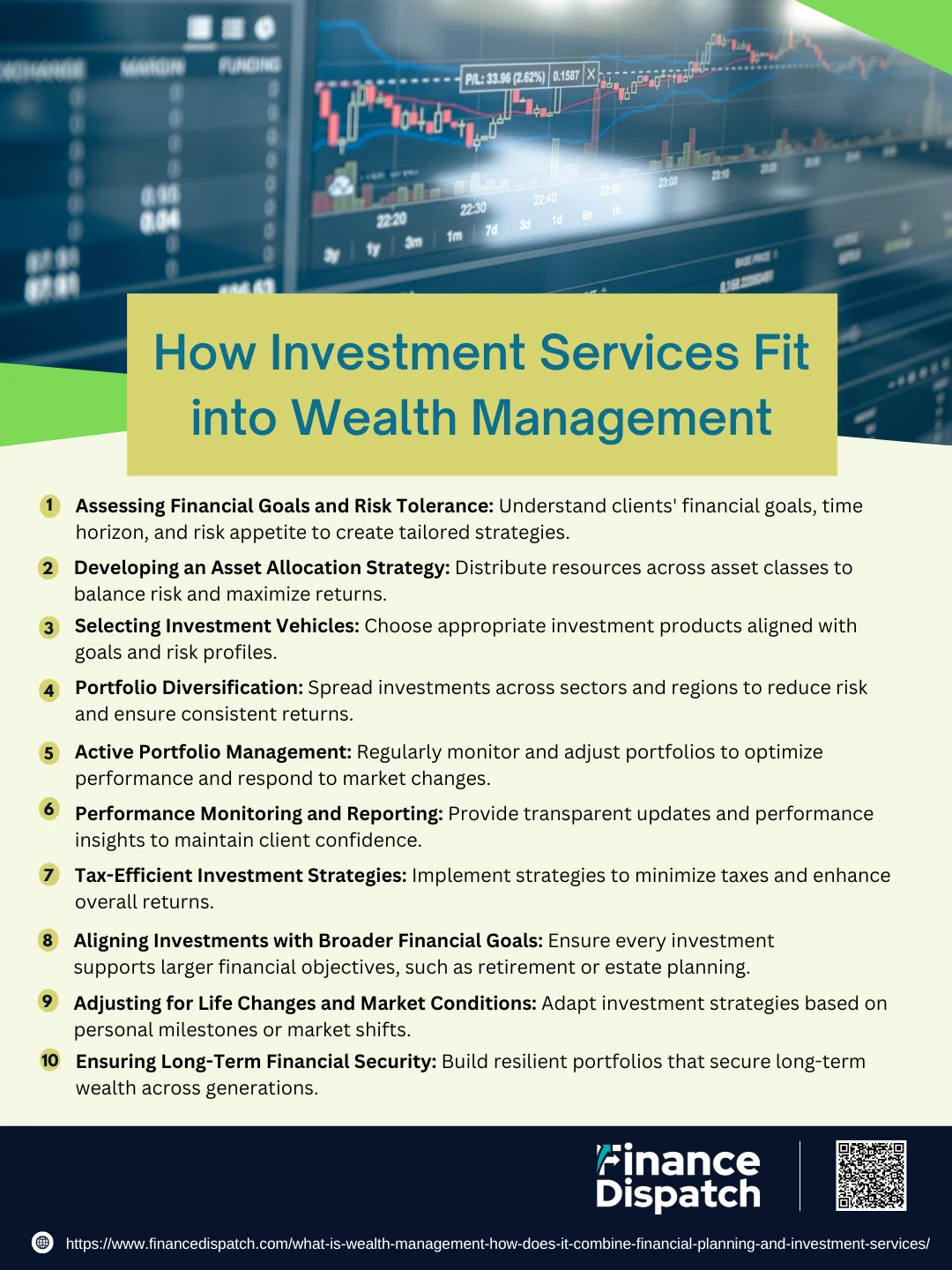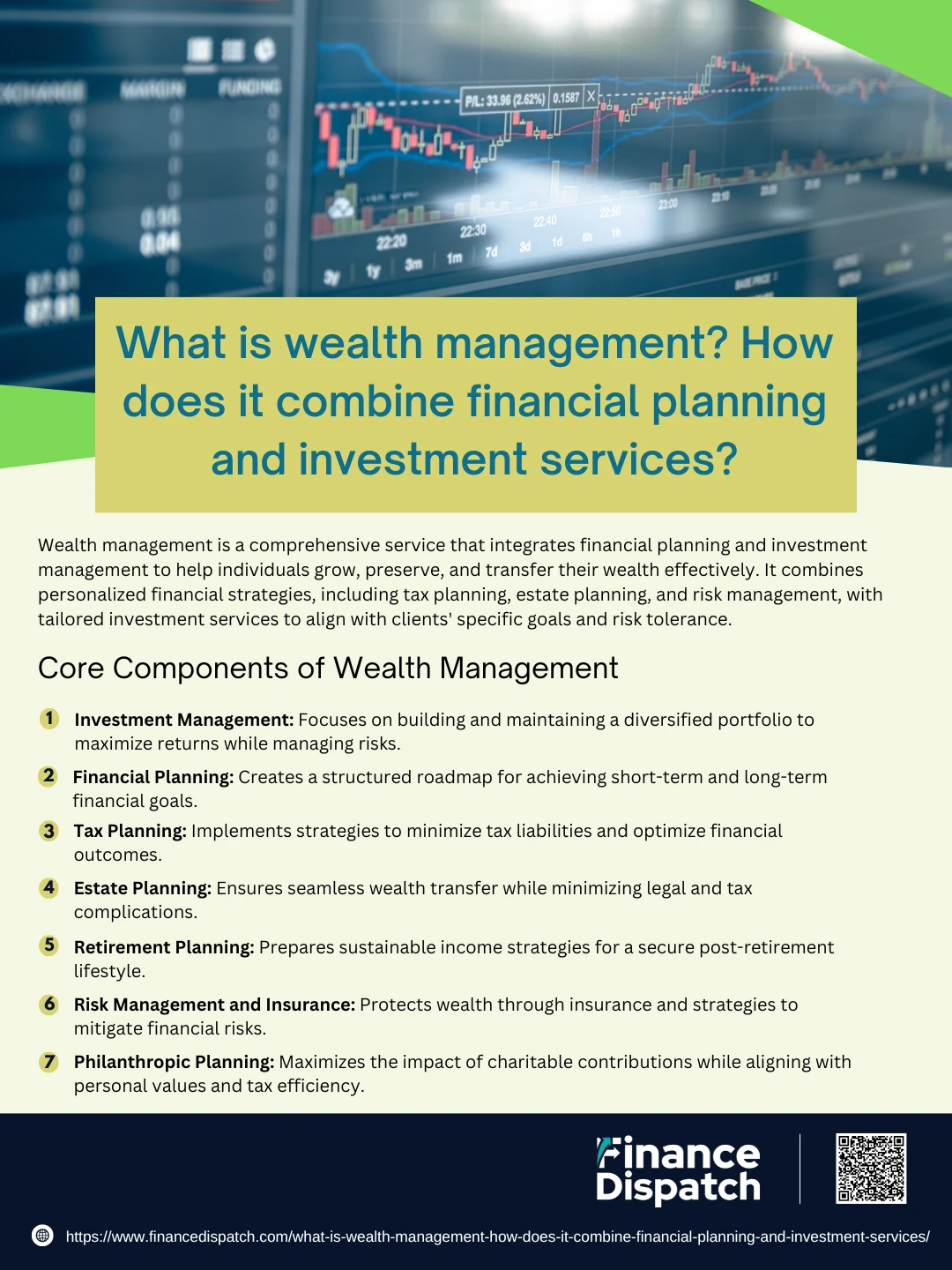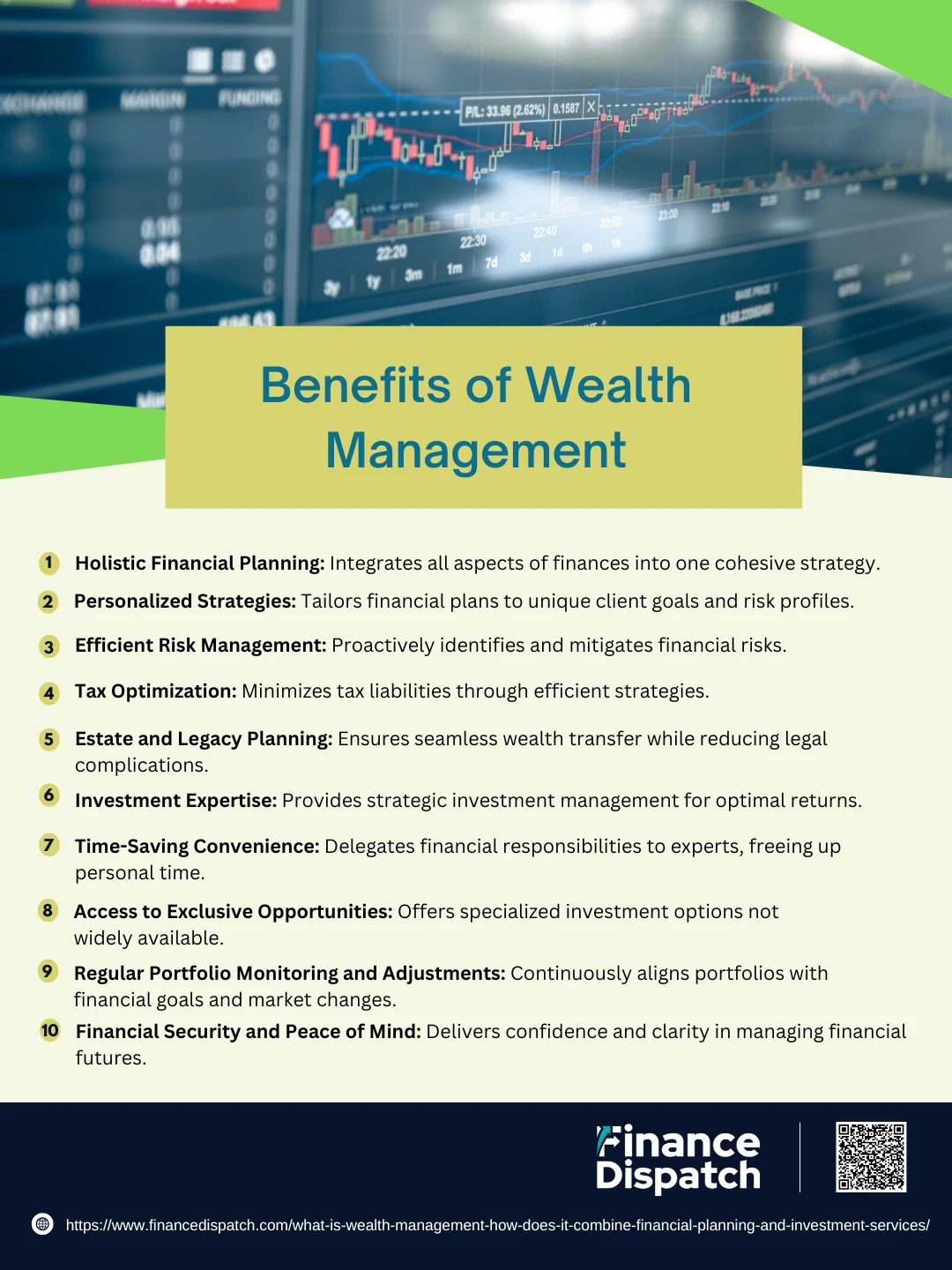In today’s complex financial landscape, managing wealth goes far beyond simply saving money or investing in stocks. Wealth management is a comprehensive and strategic approach to securing, growing, and preserving your financial resources. It’s not just about investments or planning for retirement—it’s about creating a personalized roadmap that integrates financial planning and investment services to align with your unique life goals. Whether it’s minimizing tax burdens, planning your estate, or ensuring a comfortable retirement, wealth management combines these elements into one cohesive strategy. This article explores how wealth management serves as a bridge between financial planning and investment services, offering a holistic solution for individuals seeking not only financial growth but long-term financial security.
What is Wealth Management?
Wealth management is a holistic financial advisory service designed to help individuals and families grow, preserve, and transfer their wealth effectively. It goes beyond basic financial planning or investment advice by integrating multiple financial disciplines, such as tax optimization, estate planning, risk management, and retirement strategies, into one cohesive plan. Tailored to the unique needs, goals, and risk tolerance of each client, wealth management provides a personalized approach to financial decision-making. Wealth managers act as financial architects, building a long-term strategy that aligns every aspect of a client’s financial life to achieve sustainable growth and security. Whether addressing complex investment portfolios, planning for generational wealth transfer, or mitigating financial risks, wealth management offers a comprehensive solution for navigating life’s financial challenges and opportunities.
Core Components of Wealth Management
Wealth management is a multidimensional approach to financial well-being that combines various financial disciplines into a unified plan tailored to an individual’s unique needs and goals. Each component serves a specific purpose, but together, they create a holistic strategy for building, preserving, and transferring wealth. Below is a detailed breakdown of the core components of wealth management:
1. Investment Management
Investment management lies at the heart of wealth management. It focuses on creating and maintaining a well-structured investment portfolio that aligns with a client’s financial goals, risk tolerance, and time horizon. Wealth managers assess market trends, evaluate asset classes, and select investment vehicles such as stocks, bonds, real estate, or alternative investments. The primary goal is to maximize returns while managing risks. Regular portfolio monitoring, rebalancing, and performance analysis ensure the investments remain aligned with the client’s long-term financial objectives, adapting to changing market conditions and personal circumstances.
2. Financial Planning
Financial planning serves as the blueprint for an individual’s financial journey. It involves setting short-term and long-term financial goals, analyzing income and expenses, and creating budgets to allocate resources efficiently. Financial planning also includes preparing for significant life milestones, such as buying a home, funding children’s education, or planning for early retirement. Wealth managers collaborate with clients to create a customized plan that provides clarity and structure, ensuring that every financial decision supports their overarching life objectives.
3. Tax Planning
Tax planning is a critical component of wealth management, aiming to minimize tax liabilities and maximize wealth preservation. It involves identifying tax-saving opportunities, utilizing tax-advantaged accounts, and strategically timing income and expenses to reduce the overall tax burden. Whether it’s optimizing deductions, capital gains strategies, or estate taxes, effective tax planning ensures that clients retain more of their earnings and investments. Wealth managers often work alongside tax professionals to ensure compliance with tax laws while optimizing financial outcomes.
4. Estate Planning
Estate planning ensures that wealth is transferred to beneficiaries according to the client’s wishes while minimizing legal complications and tax liabilities. This involves drafting wills, setting up trusts, and designating beneficiaries for financial accounts and insurance policies. Estate planning also includes strategies for wealth preservation across generations, ensuring assets are protected and distributed efficiently. Proper estate planning not only safeguards wealth but also provides peace of mind for clients and their families.
5. Retirement Planning
Retirement planning focuses on ensuring financial security during the post-working years. This involves estimating future expenses, identifying income sources such as pensions, savings, and investment returns, and creating withdrawal strategies to ensure funds last throughout retirement. Wealth managers help clients determine how much to save, where to invest, and how to structure income streams to maintain their desired lifestyle without financial strain. Proactive retirement planning reduces uncertainty and prepares clients for a comfortable and stress-free retirement.
6. Risk Management and Insurance
Risk management aims to protect wealth from unforeseen events and financial losses. Wealth managers assess potential risks, such as market volatility, health emergencies, or property damage, and recommend suitable insurance products to mitigate these risks. Common insurance plans include life insurance, health insurance, property insurance, and liability coverage. Effective risk management ensures financial stability and provides a safety net, allowing clients to focus on their long-term goals without fear of financial disruptions.
7. Philanthropic Planning
For clients interested in giving back to society, philanthropic planning provides strategies to maximize the impact of charitable contributions. This may involve setting up charitable trusts, donor-advised funds, or foundations. Philanthropic planning ensures that donations are made in a tax-efficient manner while aligning with the client’s values and legacy goals. Wealth managers help structure contributions to benefit both the causes the client supports and their overall financial strategy, ensuring a meaningful and lasting impact.
How Financial Planning Fits into Wealth Management
Financial planning serves as the foundation of wealth management, acting as the blueprint upon which all other financial strategies are built. It involves analyzing an individual’s current financial situation, identifying long-term and short-term goals, and creating actionable steps to achieve those objectives. In wealth management, financial planning ensures that every decision—whether related to investments, taxes, or estate planning—aligns with the client’s broader financial vision. Without a solid financial plan, even the most sophisticated investment strategies may lack direction and purpose. Below is a table illustrating the relationship and differences between financial planning and wealth management.
Table: Financial Planning vs. Wealth Management
| Criteria | Financial Planning | Wealth Management |
| Primary Focus | Goal setting, budgeting, and financial road mapping. | Holistic approach integrating financial planning, investment, tax, and estate strategies. |
| Scope | Focuses on cash flow, savings, and short-term to medium-term goals. | Encompasses investments, tax optimization, estate planning, and risk management. |
| Client Base | Suitable for individuals across all income levels. | Typically tailored for high-net-worth and ultra-high-net-worth individuals. |
| Goal Orientation | Helps achieve specific life goals (e.g., buying a home, education funding). | Aims for long-term wealth preservation and intergenerational wealth transfer. |
| Investment Involvement | Limited to aligning savings with future needs. | Active management of investment portfolios for long-term growth. |
| Tax Strategies | Basic tax-saving measures and deductions. | Advanced tax strategies, including estate tax minimization and tax-efficient investments. |
| Time Horizon | Short-term and mid-term focus. | Long-term financial planning and legacy building. |
| Risk Management | Basic insurance coverage and risk mitigation. | Comprehensive risk assessment with customized insurance strategies. |
| Level of Personalization | Standardized plans tailored to specific goals. | Highly customized strategies based on individual wealth profiles. |

How Investment Services Fit into Wealth Management
Investment services are a cornerstone of wealth management, playing a critical role in growing, preserving, and optimizing financial assets. While financial planning serves as the foundation by defining goals, budgets, and long-term strategies, investment services act as the engine driving wealth creation and sustainability. Wealth managers don’t just recommend random investment products—they craft tailored investment strategies based on each client’s unique financial goals, risk tolerance, and time horizon. These services involve careful asset allocation, diversification, and risk management, ensuring that every investment decision aligns with the broader wealth management plan. Investment services also account for tax efficiency, market volatility, and changing economic conditions, providing clients with ongoing monitoring and adjustments to keep their financial plans on track. Below are the key steps illustrating how investment services integrate into wealth management:
1. Assessing Financial Goals and Risk Tolerance
Investment planning starts with a deep understanding of a client’s financial aspirations, time horizon, and risk appetite. Whether the goal is wealth accumulation, retirement planning, or legacy creation, wealth managers tailor investment strategies to suit these objectives. Risk assessments help determine the client’s comfort level with potential market fluctuations and losses.
2. Developing an Asset Allocation Strategy
Once goals and risk profiles are established, wealth managers create an asset allocation plan. This strategy determines how financial resources will be distributed across various asset classes, such as stocks, bonds, real estate, and alternative investments. Asset allocation aims to balance risk and reward while aligning with long-term objectives.
3. Selecting Investment Vehicles
Wealth managers select suitable investment instruments to execute the asset allocation strategy. These vehicles may include mutual funds, exchange-traded funds (ETFs), government bonds, real estate investment trusts (REITs), or even private equity options. Each investment is chosen based on performance history, risk factors, and alignment with the client’s goals.
4. Portfolio Diversification
Diversification is key to reducing risk while maintaining growth potential. Wealth managers spread investments across different sectors, regions, and financial instruments to minimize exposure to any single point of failure. This approach protects against market volatility while offering opportunities for consistent returns.
5. Active Portfolio Management
Wealth management isn’t static; it requires ongoing monitoring and adjustments. Wealth managers actively review portfolios, monitor market trends, and make strategic decisions to optimize performance. This may include rebalancing assets, exiting underperforming investments, or capitalizing on new opportunities.
6. Performance Monitoring and Reporting
Transparency is essential in wealth management. Wealth managers provide regular updates and detailed performance reports to clients. These reports include insights into portfolio growth, risk exposure, and alignment with financial goals. Performance monitoring helps clients stay informed and confident about their investment journey.
7. Tax-Efficient Investment Strategies
Tax efficiency is a critical aspect of investment services. Wealth managers use strategies such as tax-loss harvesting, investing in tax-advantaged accounts (e.g., IRAs or 401(k)s), and timing asset sales to minimize capital gains taxes. These approaches ensure clients retain more of their earnings and maximize investment returns.
8. Aligning Investments with Broader Financial Goals
Investment decisions are not made in isolation—they are part of a larger wealth management strategy. Whether the focus is on retirement savings, estate planning, or philanthropic giving, wealth managers ensure that every investment aligns with these overarching objectives. This alignment creates a seamless financial plan where every piece supports the broader vision.
9. Adjusting for Life Changes and Market Conditions
Life is dynamic, and so are financial markets. Wealth managers regularly revisit investment strategies to account for significant life changes such as marriage, career transitions, or inheritance. They also adapt portfolios to respond to market volatility, economic downturns, or emerging financial opportunities.
10. Ensuring Long-Term Financial Security
At its core, investment services in wealth management aim to secure long-term financial stability. This means not just focusing on immediate returns but building a resilient portfolio capable of weathering financial storms and supporting the client’s financial goals across generations.
Benefits of Wealth Management
Wealth management is not just about increasing your financial assets; it’s about building a comprehensive, strategic plan that safeguards your wealth, aligns with your goals, and ensures long-term financial well-being. Tailored specifically for high-net-worth individuals and families, wealth management integrates financial planning, investment management, estate planning, and tax strategies into one seamless approach. A wealth manager serves as a trusted advisor, helping clients navigate complex financial decisions, minimize risks, and capitalize on opportunities. Whether you’re planning for retirement, managing an inheritance, or preparing a financial legacy for future generations, wealth management offers clarity, structure, and peace of mind. Below are the key benefits of wealth management, explained in detail:
1. Holistic Financial Planning
Wealth management takes a comprehensive view of your entire financial life. Instead of focusing on isolated financial aspects like investments or taxes, it integrates every facet, including estate planning, risk management, retirement strategies, and tax optimization. This ensures that every decision supports your overarching financial goals, creating a well-rounded financial plan that evolves with your needs.
2. Personalized Strategies
No two clients are the same, and wealth management reflects this through tailored financial strategies. A wealth manager takes the time to understand your financial goals, risk tolerance, family dynamics, and long-term vision. The result is a bespoke financial plan designed to address your unique needs and aspirations, ensuring every action aligns with your financial objectives.
3. Efficient Risk Management
Financial markets are inherently volatile, and unexpected life events can impact your financial stability. Wealth managers proactively identify potential risks and implement strategies to mitigate them. This may include insurance planning, diversified investment portfolios, or contingency funds to shield your wealth from unforeseen circumstances.
4. Tax Optimization
Taxes can significantly erode investment returns and wealth accumulation if not managed properly. Wealth managers employ advanced tax strategies to minimize liabilities, including tax-efficient investments, optimizing deductions, and timing income withdrawals strategically. These approaches ensure that more of your earnings are preserved and reinvested for growth.
5. Estate and Legacy Planning
Wealth managers help structure your estate plan to ensure a smooth transfer of assets to your heirs while minimizing taxes and legal complications. They assist with wills, trusts, and beneficiary designations, creating a legacy plan that aligns with your wishes and protects generational wealth.
6. Investment Expertise
Wealth managers bring expertise in managing complex investment portfolios. They analyze market trends, allocate assets strategically, and diversify investments across various asset classes to optimize returns. Active portfolio monitoring and periodic rebalancing ensure that your investments remain aligned with your financial objectives, even in volatile market conditions.
7. Time-Saving Convenience
Managing finances, overseeing investments, navigating taxes, and planning estates can be time-consuming and overwhelming. Wealth managers handle these tasks on your behalf, providing professional oversight and freeing up your time to focus on your career, family, or personal passions.
8. Access to Exclusive Opportunities
Wealth managers often have access to exclusive investment opportunities not available to the general public, including private equity, hedge funds, and specialized financial products. These opportunities can provide higher returns or serve as valuable diversification tools for your portfolio.
9. Regular Portfolio Monitoring and Adjustments
Financial markets and personal goals are ever-changing. Wealth managers continuously monitor your investment portfolio and make adjustments to align with shifting market conditions, economic trends, and changes in your personal circumstances. This proactive approach ensures consistent progress towards your financial goals.
10. Financial Security and Peace of Mind
Perhaps the most profound benefit of wealth management is the peace of mind it offers. Knowing that your finances are being managed by a team of experienced professionals allows you to focus on what matters most—whether it’s growing your business, enjoying retirement, or spending time with loved ones. Wealth management not only secures your financial future but also reduces the emotional stress associated with complex financial decisions.
Differences between Wealth Managers and Other Financial Advisors
While both wealth managers and financial advisors play crucial roles in guiding individuals toward financial success, their scope, expertise, and client focus differ significantly. Financial advisors typically offer advice on specific financial goals, such as saving for retirement, creating a budget, or managing debt. In contrast, wealth managers provide a more holistic approach, focusing on high-net-worth and ultra-high-net-worth individuals. They integrate financial planning, investment management, estate planning, tax strategies, and risk management into a cohesive plan tailored to long-term wealth preservation and growth. Understanding these distinctions is essential when choosing the right professional for your financial needs. The table below highlights the key differences between wealth managers and other financial advisors:
Table: Wealth Managers vs. Other Financial Advisors
| Criteria | Wealth Managers | Financial Advisors |
| Client Base | High-net-worth (HNW) and ultra-high-net-worth (UHNW) individuals and families. | Individuals across all income levels. |
| Scope of Services | Holistic approach: financial planning, investment management, estate planning, tax strategies, and risk management. | Often focuses on specific areas such as budgeting, savings, retirement, or investments. |
| Primary Objective | Long-term wealth preservation, growth, and intergenerational wealth transfer. | Achieving specific financial goals, such as buying a home, saving for college, or planning for retirement. |
| Customization Level | Highly personalized and tailored strategies based on complex financial situations. | Standardized financial plans with moderate customization. |
| Investment Management | Actively managed, diversified investment portfolios with access to exclusive opportunities. | Basic investment strategies, often using pre-set portfolios. |
| Tax Strategies | Advanced tax planning, including estate tax minimization and tax-efficient investments. | General tax guidance and retirement account optimization. |
| Estate and Legacy Planning | Comprehensive estate planning, including trusts, wills, and intergenerational wealth transfer strategies. | Limited or no estate planning services. |
| Risk Management | In-depth risk assessment with integrated insurance and liability management plans. | Basic insurance recommendations. |
| Minimum Investment Requirements | Typically high (e.g., $1 million in assets under management or more). | Lower or no minimum investment requirements. |
| Certifications | Often holds advanced certifications such as CFA (Chartered Financial Analyst), CWM (Certified Wealth Manager), or CFP (Certified Financial Planner). | Common certifications include CFP (Certified Financial Planner) and other entry-level credentials. |
| Relationship Model | Long-term, ongoing relationships with regular reviews and adjustments. | Often goal-specific or transactional relationships. |
| Compensation Structure | Fee-based or fee-only, often a percentage of assets under management (AUM). | Fee-only, fee-based, or commission-based compensation. |

How to Choose the Right Wealth Manager
Selecting the right wealth manager is one of the most important financial decisions you’ll ever make. A wealth manager isn’t just someone who advises on investments—they are your financial partner, helping you navigate complex financial landscapes, manage risks, optimize taxes, and plan for long-term wealth preservation. Given the deeply personalized nature of wealth management, the right professional must align with your financial goals, risk appetite, and communication style. With so many wealth managers available, it can feel overwhelming to make a choice. Below are key steps to help you select the right wealth manager who fits your needs and vision.
1. Assess Your Financial Needs and Goals
Before starting your search, clarify your financial objectives. Are you focusing on retirement planning, wealth preservation, estate planning, or investment growth? Understanding your goals will help you identify a wealth manager who specializes in the areas that matter most to you.
2. Verify Qualifications and Certifications
Check the wealth manager’s credentials to ensure they have the necessary expertise. Look for designations such as:
- CFA (Chartered Financial Analyst)
- CFP (Certified Financial Planner)
- CWM (Certified Wealth Manager)
These certifications demonstrate a commitment to professional standards and expertise in financial planning and wealth management.
3. Understand Their Fee Structure
Wealth managers can charge in various ways: fee-only, fee-based, or commission-based. Fee-only advisors are often considered more transparent as they earn their income solely from client fees, reducing potential conflicts of interest. Clarify the fee model upfront to ensure it aligns with your expectations.
4. Evaluate Experience and Expertise
Ask about the wealth manager’s experience, including the types of clients they typically serve and their areas of specialization. A wealth manager who regularly handles complex financial portfolios is more likely to understand your unique financial challenges.
5. Check Fiduciary Duty
Ensure that your wealth manager follows a fiduciary standard. Fiduciaries are legally obligated to act in your best interest, putting your financial goals ahead of their own profits. Ask them directly whether they operate under this standard.
6. Review Their Range of Services
Wealth management goes beyond investments. Look for a professional who offers comprehensive services, including:
- Financial planning
- Investment management
- Tax optimization
- Estate planning
- Risk management
Ensure the wealth manager can address all your financial needs under one umbrella.
7. Assess Communication Style and Availability
Good communication is crucial in a long-term financial partnership. Ask how often you’ll meet, how they provide updates, and their preferred communication channels. A wealth manager who aligns with your communication preferences will make the relationship smoother.
8. Ask for References and Reviews
Request references from existing clients or look for online reviews and testimonials. This will give you insight into their client satisfaction levels and service quality. Pay attention to any recurring complaints or red flags.
9. Understand Their Investment Philosophy
Every wealth manager has a unique approach to investments. Ask about their strategy, whether they favor active or passive management, and how they handle market volatility. Ensure their philosophy aligns with your risk tolerance and financial objectives.
10. Schedule an Initial Consultation
Most wealth managers offer a free initial consultation. Use this opportunity to ask questions, evaluate their approach, and determine if you feel comfortable working with them. Trust and rapport are essential for a successful wealth management relationship.
Wealth Management in Practice: Case Study Example
Imagine John, a 55-year-old business owner, who accumulated substantial wealth over two decades but faced challenges managing his finances effectively. His priorities included securing a comfortable retirement, minimizing tax liabilities, and ensuring a smooth transfer of wealth to his children. After engaging a wealth manager, John’s financial situation was assessed comprehensively, leading to a tailored strategy that combined investment management, estate planning, and tax optimization. His portfolio was diversified across equities, bonds, and alternative assets to balance growth and risk, while tax-efficient strategies, such as contributing to retirement accounts and charitable giving through a donor-advised fund, helped reduce his tax burden. The wealth manager also established a trust to ensure his wealth was transferred seamlessly to his children. Through ongoing monitoring, regular reviews, and adjustments to his financial plan, John achieved financial clarity, long-term security, and the peace of mind that his legacy was protected for future generations. This case study illustrates how wealth management goes beyond investment advice, offering a holistic approach to address complex financial needs.
Alternatives to Traditional Wealth Management
While traditional wealth management services offer a holistic and personalized approach to managing finances, they often come with high minimum investment requirements and costs, making them inaccessible for many individuals. Fortunately, a range of alternative options has emerged, offering flexible, cost-effective, and technology-driven solutions for those who may not meet the criteria for traditional wealth management. These alternatives leverage digital tools, automation, and innovative financial products to deliver financial planning, investment strategies, and portfolio management tailored to various financial needs and goals. Below are some popular alternatives to traditional wealth management, each offering unique benefits to suit different financial circumstances.
- Robo-Advisors: Automated platforms offering algorithm-driven financial planning and portfolio management with minimal fees.
- Online Financial Advisors: Virtual advisors providing personalized financial advice through digital platforms and video consultations.
- Financial Planning and Budgeting Apps: User-friendly apps that help individuals track spending, set financial goals, and manage budgets efficiently.
- DIY Investment Platforms: Online brokerage accounts enabling individuals to manage their own portfolios with access to financial tools and resources.
- Family Offices: Specialized firms managing financial affairs, investments, and estate planning for ultra-high-net-worth families.
- Tax-Optimized Investment Platforms: Platforms focusing on maximizing investment returns through advanced tax strategies and efficient asset allocation.
- Hybrid Wealth Management Models: A mix of human advisors and automated tools, offering personalized advice with technology-driven convenience.
- Index Funds and ETFs: Low-cost investment vehicles offering diversified exposure to markets, suitable for hands-off investors.
- Community-Based Financial Groups: Financial planning groups or clubs where members share insights, resources, and strategies for wealth building.
- Subscription-Based Financial Planning Services: Flat-fee financial planning services offering ongoing support without requiring a high asset threshold.
Conclusion
Wealth management is more than just managing investments—it’s about creating a comprehensive financial strategy that integrates financial planning, tax efficiency, estate planning, and risk management into one cohesive plan. Whether you choose traditional wealth management services or explore modern alternatives such as robo-advisors, DIY investment platforms, or subscription-based financial planning, the goal remains the same: to build, protect, and preserve your wealth for the long term. Each approach offers unique benefits, catering to different financial situations, goals, and levels of expertise. The key lies in identifying the right solution that aligns with your financial aspirations, risk tolerance, and lifestyle. With the right wealth management approach—whether traditional or alternative—you can navigate financial complexities confidently, achieve your long-term objectives, and secure a stable financial future for yourself and future generations.





